Capital Market Kallithea area – This is not just a retail outlet in the center of the area, it is a part of history natives of Pontus, who founded and populated this area of Athens.
Every Saturday my grandfather would come home with a cart full of colorful, translucent plastic bags filled with fruits and vegetables, writes Eleni TzannatouIt was one of those old metal carts that let you see everything that was crammed inside or tied to the sides: fruits, vegetables, bunches of parsley and saffron, which were easier to see because they stuck out of paper bags. Meanwhile, meat and fish were wrapped in white and gray wrapping paper with folkloric illustrations.
He would fill his cart at the covered market in Kallithea, south of Athens – a ritual he followed every week without fail – and then distribute the fresh “trophies” to the entire family. I called him “farmers market”because that's what it looked like to me, only it was open every day and it was indoors, not outdoors like the neighborhood market. Little by little, I realized that this wasn't just a place where my grandfather bought his fruit and vegetables, it was an important part of Kalithea's history, even if passersby, including locals, rushed past without always realizing its significance.
Things have changed since I was young, but the market has remained almost unchanged, as a vibrant city institution can be. Almost all of its 70-year history is on the shelves of its stalls and shops: from the first Pontian merchants who built it, who arrived here after the population exchange between Greece and Turkey in 1922, to their children and grandchildren who maintain the business today, to the young people who have chosen it and keep alive the so-called “little Varvakeio” of Kallithea in relation to the big covered market in the center of Athens.
Charalampos Polatidis has been here since day one
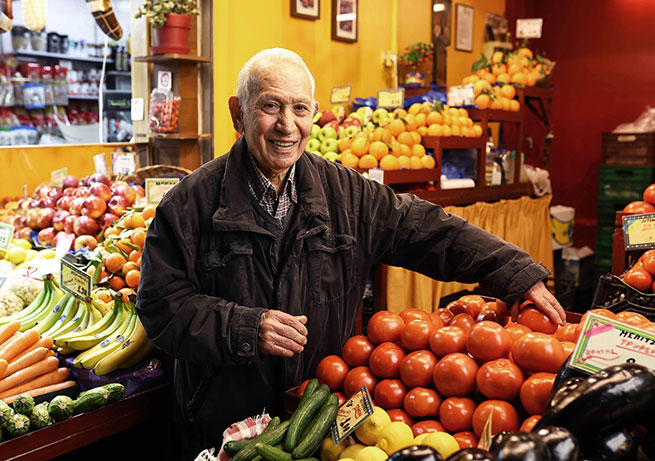
Charalampos Polatidis will never give up the market. [Никос Коккалиас].
If you enter from Griparis Street, you will find the entire history of the market in the first small but colorful shop you come across. If you pass by early in the morning, you will see Charalampos Polatidis. He still works here every day, although he has retired, and his daughter Ioanna has been running the shop for many years – in many of the stalls and shops in the market, the family business is passing to the second or even third generation.
Charalampos is also a descendant of the Pontian refugees who settled in Kallithea after the disaster in Asia Minor, long before the market took on the form we know today, setting up their stalls with their wares in the surrounding streets. He remembers the times when they moved with their wares from Filaretou Street to Platonos Street. “We were often told to move on, thus giving ourselves a reprieve.”
In many of the market stalls and shops, the family business is now in its second or even third generation.
However, Charalampos recalls, since business was going well, in 1956 the open-air traders managed to buy two plots of land where the market is now located (at the corner of Gripari, Filareto, Platonos and Davaki), and the following year the market, covered with asbestos cement sheets, was built.
And even if you don't believe in luck, you can't help but admit that there's something going on with the number 56 in this case. In 1956, the market was first established. It was divided into 56 shops, which were in turn distributed by lottery, and Haralampos got shop number 56.
With a broad smile, the oldest trader of the market tells the story of this landmark, which is, in fact, his whole life. He remembers that when the market opened, there was a great rush. People came to shop from other areas, for example, from Nea Smyrni, because there were no supermarkets on every corner. And he shares some secrets, for example, that this side, where his shop is located, is also the busiest part of the market – this is the section that starts from Platonos and ends at Griparis.
I ask him if he ever thought about leaving the market and doing something else. “Where?” ” he asks. His daughter, standing in the back of the store, disagrees. “I am among those who want to leave”she says. Having spent her entire life at the market, but officially heading the family shop since 1995, Ioanna Polatidi notes that it is a very tiring job, requiring you to work about 15 hours a day, without weekends or holidays. She does not hide the fact that the market's attendance has now fallen, and often their salaries are only enough to cover expenses. “But I am grateful to everyone who comes,” she says, “because “Our market is a pearl”. Even if not everyone knows about it.”
Stavros Antonopoulos: The second oldest

Stavros with Chrysoula Kapiri, president of the market. [Никос Коккалиас].
“Haralambos and I have been here the longest”“, says Stavros Antonopoulos, sipping coffee. “I'm a bit younger, of course,” he adds. “The others have already left.” He looks smart in his flat cap and long coat. Although he claims to be in his second year, it has been many years since he stopped working at the market.
He started working in 1971, the first eight years in one shop and the next 25 in another, both shops rented and with owners since then. But he already knew the area. He had moved to Kallithea the year before and got a job behind the cheese counter at the Gavalakis brothers’ supermarket, which was next to the market on Platonos Street (to locals, where the Hytiroglou homeware store is today).
Stavros says that at the time, it was the only supermarket in Kalithea. As such, the heart of the area’s commercial hub attracted people from the surrounding areas, including Koukaki, Nea Smyrni and Moschato. In its heyday, the market was so busy that the restrictions on the expansion of each store were very specific: “We couldn't even put a box over the line”he recalls. Today there are no such restrictions; the market is generally not as lively, but traditionally more people visit it on Saturdays.
The seasoned veteran of the market has calmly accepted the job he has done all his life and, like many others here, has developed a deep love for it. Something still ties him to this corner of the neighborhood, so much so that he chooses to come here every morning to drink coffee, chat with friends and acquaintances, and watch the people go by. “As long as we live, we will continue to come here,” he says with disarming determination.
Lefteris Zontiros: Coffee Master

The entire market drinks coffee from Lefteris' hands.
The market used to have a coffee shop upstairs (the top floor is now used as a warehouse), and workers would lower a tray of hot coffee to the vendors on a rope. There were other interesting inventions in the market: if you see old speakers somewhere in the center, they were not used to listen to music, but to make announcements to small children who had lost their parents in the chaos.
Lefteris Zontiros, one of the market’s newest visitors, has heard the stories too. He is originally from Piraeus and was wandering around the area four years ago looking for a shop to rent. He was unfamiliar with the market, but by chance he saw one of its corner shops on Platonos Street for rent. He made a deal the very next day.
Since then, he has been working here every day from five in the morning, brewing coffee – even on the sand, for the most demanding customers. Small coffee pots and coffee makers are ready from the moment the first catches hit the fishmongers' shelves until midday, when everything begins to quiet down.
This is the only cafe on the market, so almost every trader visits Lefteris's coffee shop. He also has his own standard customers, whose orders he remembers – he knows who wants coffee at eight, who at nine, and so on. For the rest of the orders, his employee helps prepare the coffee and delivers it.
Kaspar Batanyan: pasturma professional

The most exquisite tastes of the market can be found in Kaspar's shop.
Story Kaspar Batanyan began more than a century ago in the depths of Asia Minor, in Kayseri (formerly Caesarea). It was there, in the birthplace of pastourma – well-roasted, air-dried beef – that his grandfather, who bore the same name as his grandson, lived.
Grandfather Batanyan knew all the secrets of the most famous oriental mezes, as well as other delicacies such as crab meat and pig head jelly known as “pihti”. Having fled the Asia Minor disaster in 1922, he ended up in Piraeus. It is likely that pastourma was introduced to the Greek port by someone like him. Initially, Kaspar (grandfather) opened a small workshop where he prepared his exquisite delicacies. Over time, his son took over another small shop and began selling the family's products at the Piraeus market.
In the 100 years since then, the family Batanyan became masters of pastourma and sausages. Today, Kaspar (grandson) and his brother Aram own several shops in Attica, and their children, already the fourth generation, have taken over the management of the family factory in Koropi, East Attica.
But every morning, Kaspar heads to his shop in the heart of the Kallithea market, which he opened with his brother in 1980. Over the years, they have moved from one market to another several times, and today their stall contains the most characteristic tastes and smells of the market. Most of the delicacies come from the family factory, that is, all the cold cuts, but there are also other delicacies, such as spreads, which are made by hand. The owner will not let you go until you have tried at least some of these delicacies.
At a time when some shops in the market have closed and most traders admit that business is falling, “because young people don't have time and they prefer to buy everything ready-made in the supermarket“, one can only wonder how a store like Ar. Cas (as the two brothers named it, from the initials of their names) can survive with more specialized products.
And yet, it is precisely because of this that he survives. As Kaspar says, many gourmets visit the shop, while most others do their basic shopping first and then come in for special treats, especially if they have a dinner party coming up. One thing is for sure, as the owner says: “Greeks love to eat.”

“Greeks love to eat”– says the owner of the grocery store….
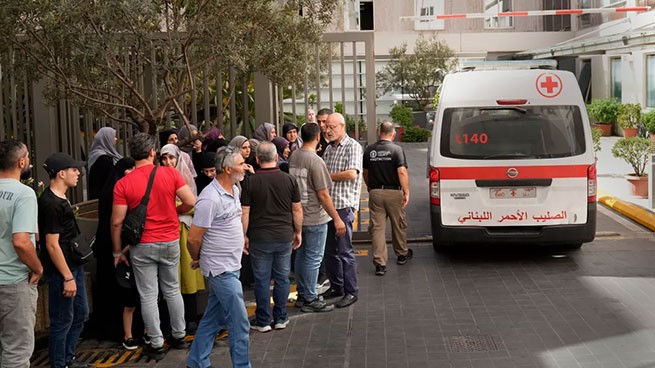
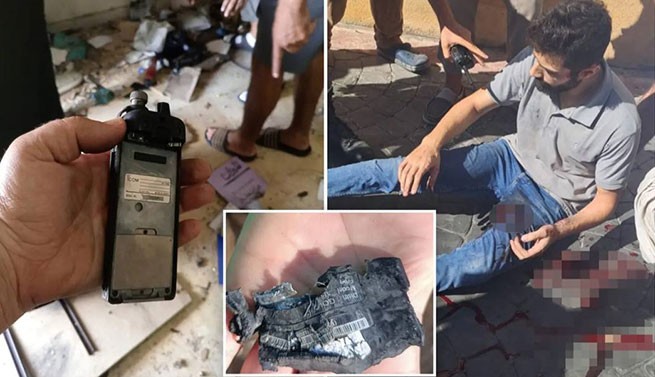

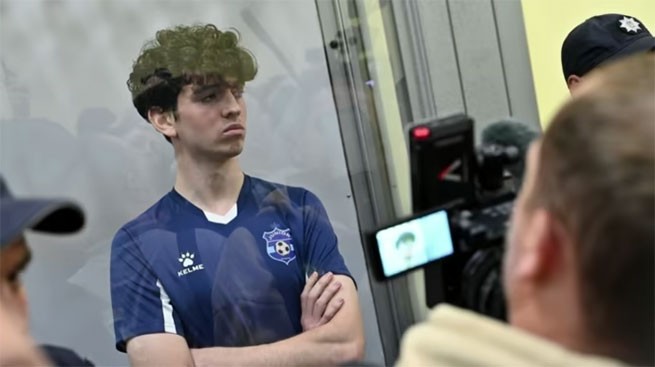

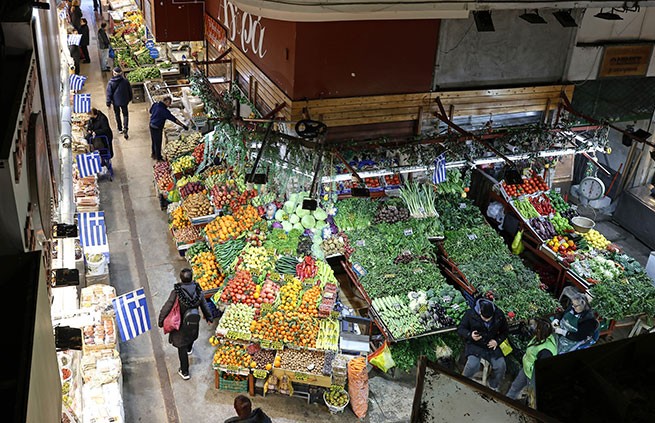

More Stories
The Magic Number 56 and the Covered Market of Kalithea. Part 2
Istanbul pogrom, September 6-7, 1955
Türkiye Bans Patriarch Bartholomew from Serving at Panagia Sumela Monastery